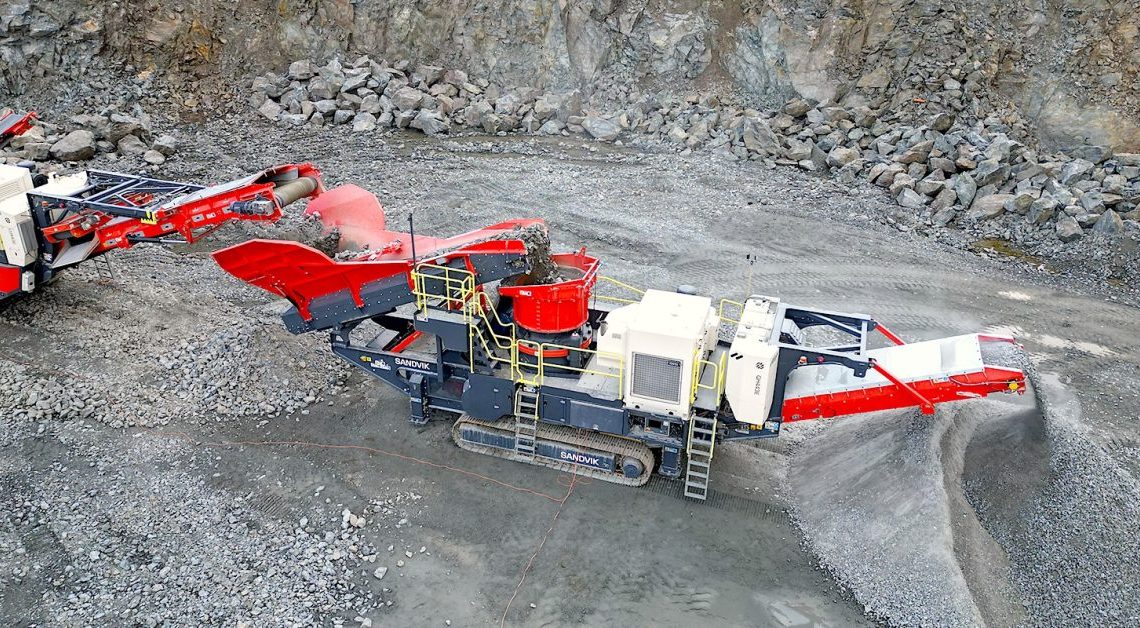
The new flagship Q-Range electric drive cone plant from the quarry experts at Sandvik is engineered to be safe, quiet, and tough enough to operate in the most hostile environments the mining and quarrying industries can put it in.
Cone crushers enhance quarrying efficiency by enabling operators to crush rock, stone, and ore down to a precise size. In ELI5 terms, big rocks go into the top of the plant. Inside, a cone-shaped mantle moves inside a larger cone in an eccentric circle that grinds up the stone and ore between the mantle and the cone’s sides, breaking them up into smaller pieces. Once the pieces are ground to a given size determined by the position of the mantle within the larger cone, they fall out into a cone-shaped pile (but that’s just a coincidence).
Basic mechanisms of cone crusher
The cone crusher is part of a broader “train” of machines on a quarry that work together to turn a massive rock face into a fine sand and/or anything in between. With the launch of the QH443E electric cone plant, Sandvik now offers mine operators a fully electric driven train – one that includes the UJ443E fully electric jaw crusher launched in 2023, the QE342e hybrid scalper, and the QA452e hybrid triple-deck Doublescreen launched in 2022 (if you want to know more about how those work, let us know in the comments).
The new QH443E features a new heavy-duty feeder design equipped with electrically driven components, which can be powered by batteries, or a connection to grid power. An on-board diesel generator capable of running on 100% HVO (hydrogenated vegetable oil), providing a number of more sustainable fuel choices and effectively reducing the mine’s operating costs.
Sandvik claims the electric delivers a 25% fuel savings on generator (and, obviously, 100% on grid or battery power), as well as a 78% reduction in oil usage compared to previous generations.
The new crusher bridges the gap between tracked mobile, wheeled portable, and stationary cone plants by combining electric drives and track mobility on a single platform. The QH443E uses Optik intuitive automation system and My Fleet remote monitoring software hooked to a suite of sensors that provide 24/7 telematics, geo-fencing, and remote-operator support that’s designed to ensure continuous crushing and optimal performance.
Those sensors also help drive innovations in safety, as well. “Safety is paramount in the design of the QH443E,” said Sandvik, in a statement. “The unit includes remote camera viewing of the crushing chamber, 270 degree access around the crusher for easy maintenance and mandatory audible and visual warnings for safe operation. Our extensive global distributor and sales support network ensures that you receive the best support for your operations.”
The QH443E is available in the EU now through Sandvik Mobile’s global dealer network, and will be available everywhere by Q4 of 2025.
Electrek’s Take

While there are a lot of people outside the drilling and mining space who may scoff at environmental concerns, the quest for improved efficiency and cost reduction among commercial fleet managers knows no political ideology. Simply put: If it’s better or cheaper, they’ll buy it. If it’s better and cheaper, they’ll buy two — and battery power is proving to be consistently better, in a broader scope of use cases, than diesel.
SOURCE | PHOTOS: Sandvik; via Global Highways, Pit & Quarry.
Author: Jo Borrás
Source: Electrek



